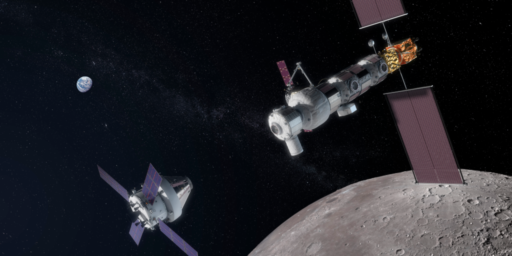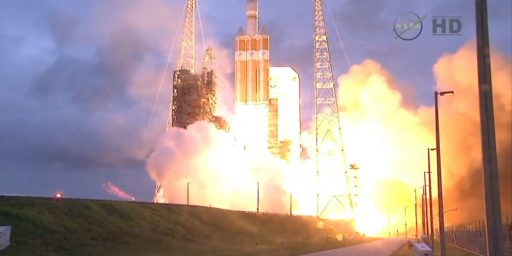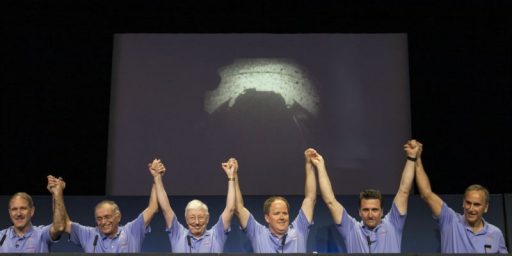Pell Money in Space?
There are better ways to use surplus Pell funds.

“Super Moon” by Steven L. Taylor is licensed under CC BY-NC-ND 4.0
The AP reports that Trump’s administration wants to re-purpose surplus Pell grant money for space exploration: Trump targets Pell Grant money for NASA’s budget boost.
Under a budget amendment sent to Congress Monday evening, the administration would use an additional $1.9 billion in surplus Pell Grant money to fund other budget priorities, including an infusion of new cash for NASA “so that we can return to Space in a BIG WAY!” President Donald Trump tweeted.
[…]
“This does not cut any spending for Pell Grant programs as the budget continues to ensure all students will get their full Pell Grant and keeps the program on sound fiscal footing,” Office of Management and Budget spokesman Wesley Denton said in a statement.
Enrollment in the program has declined since 2011, leading to a surplus of nearly $9 billion, according to the budget office. The administration had originally proposed using $2 billion of that surplus to fund other spending. The new request brings that total to $3.9 billion, which OMB described as similar to its request in the 2018 budget. The administration proposed a similar cancellation of unobligated Pell grant money for 2019, but later backed off the idea.
My initial thought on this is that if there is a surplus perhaps further spending on higher education would be the the way to go here. This is especially true knowing, as I do, how much Pell grants help students attend college as well as how much state level funding cuts have led to tuition increases.
And look, I am an official Space Nerd who used to get up early to watch space shuttle launches. Further, the romantic in me would love to see humans on the moon and on Mars. However, the realist in me can’t currently think of a reason to go to the moon that is worth the cost. And, further, the challenges (and costs) of going to Mars are immense.
Certainly, the following does not strike me as a compelling reason to divert billions away from other needed programs:
“Under my Administration, we are restoring @NASA to greatness and we are going back to the Moon, then Mars,” he wrote.
Vice President Mike Pence has called for landing astronauts on the moon within five years, and has said NASA needs to achieve that goal “by any means necessary.” This summer marks the 50th anniversary of the first manned moon landing.
“Greatness” is not a policy goal. It certainly isn’t a reason to spend that kind of money when there are other, far more pressing, needs.





What? No, and I mean HELL no!
if he wants money for SPACE FORCE then he can do work study to get the money. Have himework in the library or something!
.
(btw: you have to say SPAAAAACE FOOOORRRRCE like the Muppets did with PIIIIIIGSSSS INNNN SPAAAAACE … 🙂 )
@liberal caplitalist: Or Spaaaaaaace Ghooooooost, which predates “Pigs in Space” by some time. Link
I’m actually kind of impressed that he didn’t just use it for his fake wall.
I think crewed space travel is important in order to spread humanity out into the Solar System and, eventually, the rest of the Galaxy.
But a show mission to Mars, for which $1.6 billion is nowhere near enough, won’t accomplish any of this.
Arthur C. Clarke, another space travel enthusiast, compared the Apollo Moon landings to the late XIX Century expeditions to the North Pole. People could reach it, but only just. It would take decades before long-term expeditions there , and to the South Pole, could be sent for long periods of time to do research.
We should go back to the Moon, but only to stay. Planting another flag and bringing back more rock and soil samples, while useful, is not worth the expense. Settling the Moon, even on a temporary basis, will also take a lot more than a few billion.
@liberal caplitalist: Pigs in Space was the inspiration for the headline 😉
@Kathy: I agree in the abstract. I wonder, however, where such activities ought to be prioritized from a practical POV.
@Steven L. Taylor:
History couldn’t be clearer:
People are willing to travel very long distances, to invest large amounts of money, to accept big risks, in order to obtain a valuable commodity they can then sell back home for more money.
People are also willing to cross dangerous, inhospitable territory in these journeys, or to settle in such places given enough through traffic to make it worthwhile.
So you get things like the spice and tea trade in the Renaissance and onward, the Silk Road all the way back in Antiquity, and oases like Palmyra smack in the middle of a barren desert.
No one settles in inhospitable, hostile, dangerous territory where there is neither a valuable commodity nor traffic passing through. And that describes the Moon, Mars, and just about every other part of the Solar System that’s not Earth (and not all of Earth).
We know we can transplant bits of our planet to other places, in the form of habitats, complete with plants and animals. We don’t know what that will cost, nor even whether such places can ever be self-sufficient.
So there’s no economic reason to colonize space. none.
That makes it more difficult.
@Kathy: I’m co-signing all this.
@Just nutha ignint cracker:
My gut reaction to that was “that can’t be right”. It turns out that this is because I only knew Space Ghost from Comedy Central; I never knew it was a Saturday AM cartoon in the ’60s. (My family didn’t get its first television until just about the time it was ending. We needed one to watch the moon landings, to tie back to the real topic of this thread…)
Whodathunkit?
@DrDaveT: Oops, too late to edit — I meant Cartoon Network, not Comedy Central.
@Teve:
If you recall the early days of the Shuttle, and later on the ISS (aka Space Station Freedom for a while), there was much talk about manufacturing in space, especially drugs.
As far as I know, there haven’t even been any major experiments along such lines. Much of the science “done” in the ISS concerns the effects of prolonged weightlessness on human physiology. That will prove useful someday.
There’s been less talk about mining asteroids or the Moon. There are a few startups involved, it seems, but thus far nothing concrete. Given launch costs, it would not make sense to send robots, much less people, to mine asteroids and return to Earth.
It would make sense if you could refine the ores out in space, or on the Moon, provided you could send the refined products back to Earth cheaply. from the Moon, you could use magnetic tracks to launch cargo all the way to Earth with a very low per-launch cost, but with a really, really, really BIG start-up cost.
There’s also the host of technical matters like how to refine ores without using water, or where to get water on the Moon, etc. Plus, I don’t know whether we know what kinds of ores will be found on the Moon. Gold, platinum, rare earths, uranium, iron? I think aluminum has been found in rock samples, so maybe that’s plentiful. No clue.
The thing is it will take like several shiploads of money to develop an off-Earth mining industry, especially if it involves people, but then it should benefit us earthlings with a) cheaper materials (perhaps) and b) less mining-related pollution and environmental problems (certain).
So it might happen, but it will take decades, not to mention vision and lots of tons of money. Maybe your children, if any, will live to see it.
1.6 billion per year is hardly likely to shave 4 years off a future manned return to the Moon. And bragging about it at a Trump rally is hardly as likely to excite his partisans as an excuse to shout LOCK HER UP! So I don’t think Apollo-redux is going to get all that much push in the coming years. I think it’s more something for Mike Pence to point to — and Pence never did much when he was in Congress to suggest getting humanity into space was a goal for him.
I suspect by 2020 the Artemis program is going to be dead and forgotten for most of us, even for space buffs. Sad really, but I guess that means we will be able to cheer on the Chinese with clear consciences.
@mike shupp:
He’s expecting the Rapture to hit before we have a chance to get there…
Why is there surplus Pell Grant money? With the high cost of college, why hasn’t that money already been distributed to students who need it?
@Monala: I must confess, I am perplexed by that myself. It wasn’t all that long ago that the feds had stopped Pell money for summer classes (it was recently reinstated).
“I’m actually kind of impressed that he didn’t just use it for his fake wall.”
Ironically enough, that might have been legal, too. Kinda makes you wonder (actually, it doesn’t for me, but…).
@Monala: @Steven L. Taylor: If I were going to take a wild guess, I would guess that the granting system has not been indexed for long enough that there aren’t enough students who are both stable enough to afford the non covered costs and needy enough to qualify for the grants. Quite a few of the students I see on my days at local high schools are nervous enough about being tens of thousands in debt that pell grants are not as much of an inducement as they were in my day 50 years ago.
The idea of human space exploration is a romantic one, it is also highly impractical. It is already known that astronauts on the space station return with damaged DNA from radiation. The exact long term consequences are at this point unknown but medical science says this is not good for them. Radiation is a killer anywhere else in the solar system but not here on earth because the magnetic field and the ozone layer protect us. It is naive to think that we will be able to build an affordable transportable one. At the very least anytime soon. Meanwhile, a return trip to the moon is just the world’s most expensive cruise and any trip to Mars will mean the early deaths of those who go, even if they do make it back here.
It is also unknown if we can reproduce on any planet beyond our own planet. Early experiments in mammal reproduction in low gravity environments show it is problematic at the very least and our reproductive systems have been engineered by evolution to work on this planetary body, not others with different gravity.
My inner Sci-Fi reading romantic wants us to go but my outer realist says “At what cost?”
@OzarkHillbilly:
The ozone layer shields us from ultraviolet light. That’s easy to shield against in space. All the other radiation, not easy at all. Out in space, there’s no known shield. If there were, the ISS would have it.
But planets and natural satellites are better supplied than space. Soil makes a good shield for radiation. Yes, you need very thick layers of soil, but that just means digging your Lunar bases deep. It can be done.
For living on the Moon or Mars, the big concern is water. Without native sources of water, life will get awfully expensive. You’d either have to ship hydrogen from Earth(*), or perhaps capture comets or other small bodies with either water or hydrogen compounds.
(*) Water is hydrogen and oxygen. hydrogen is rare on the Moon, but oxygen is abundant in the crust in compounds with other elements. this is not surprising. The most abundant element in Earth’s crust is oxygen, in compounds, at around 47.5%
The reason for this is that oxygen is a very reactive element (see rust), so it binds to other elements easily and constantly. Absent other elements, oxygen reacts with oxygen, forming the O2 molecule, which is also quite reactive. Nitrogen is as or more reactive, but once it forms an N2 molecule it becomes so stable it’s almost inert.
Well, here’s a shocker. The Trump administration would rather put money in a rocket and shoot it out to space than use it to help people get an education.